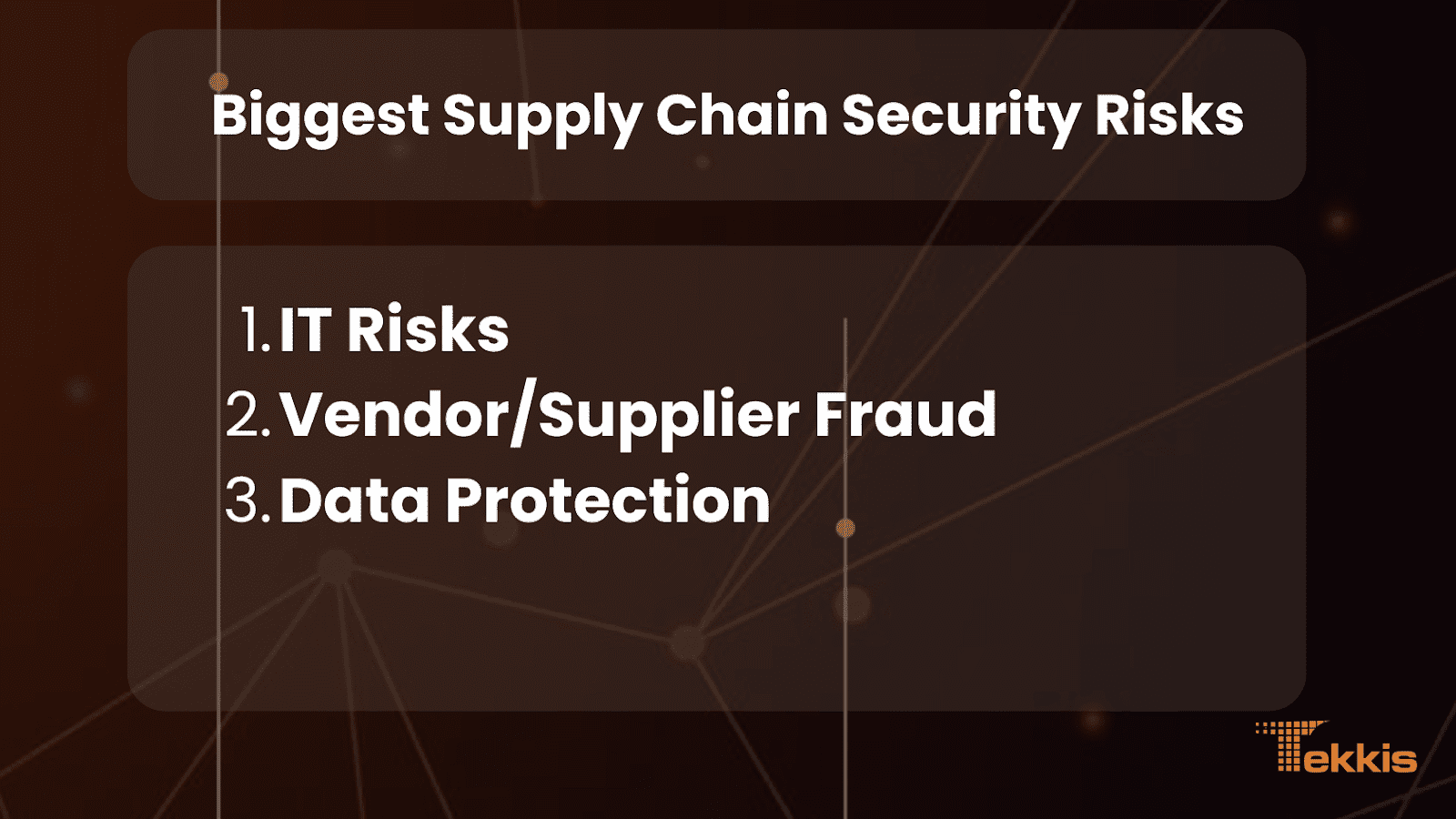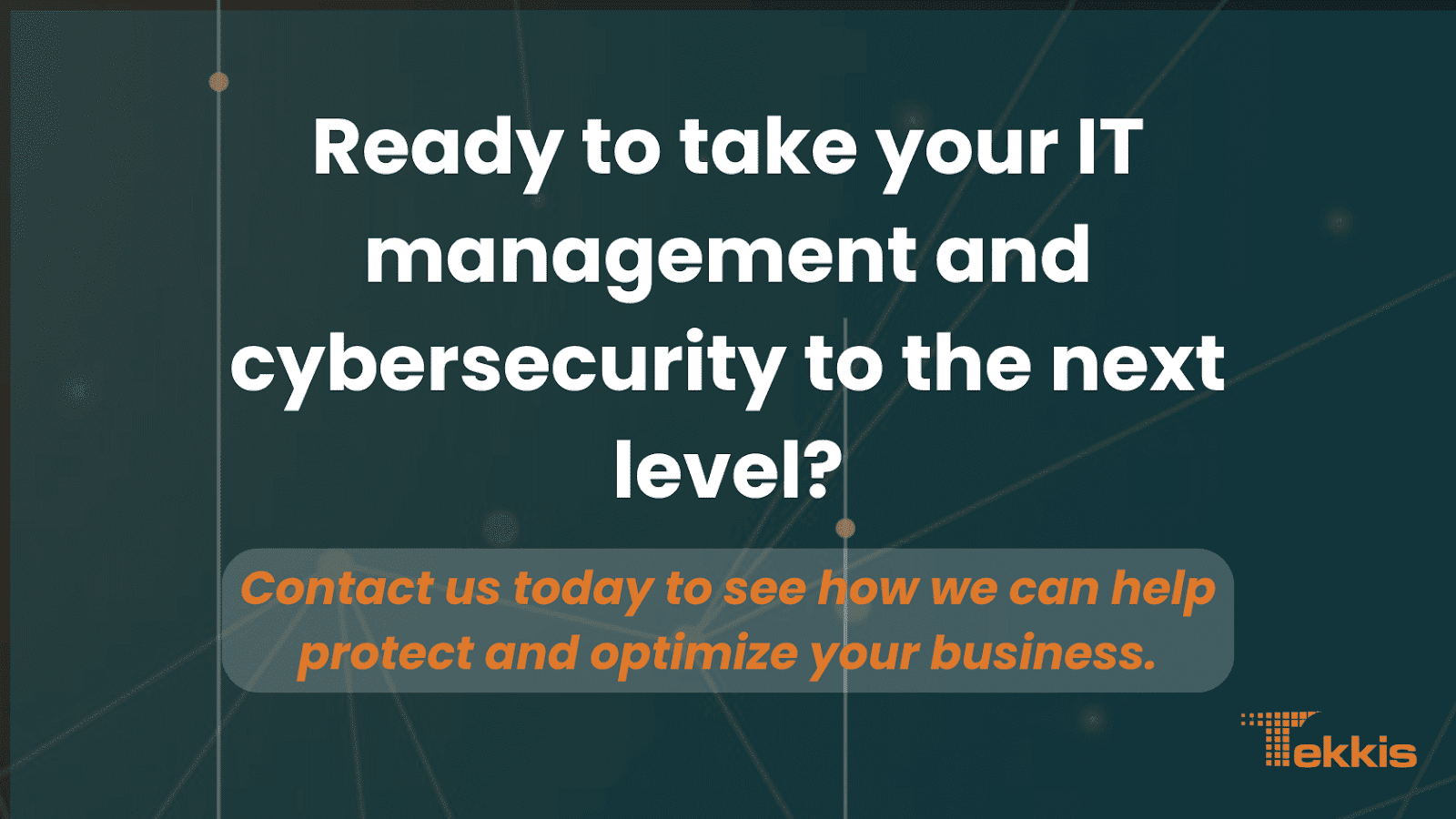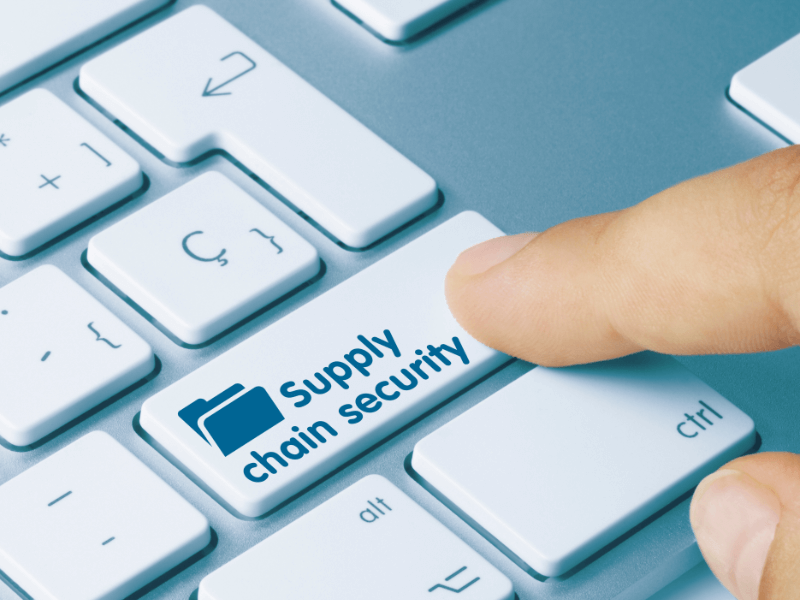Every company relies on a supply chain, regardless of the sector in which it operates. Supply chains are the link between a company and its suppliers and provide a channel for the smooth movement of goods and services.
Keeping the supply chain running in optimal condition is what keeps every company competitive. Disruptions in the supply chain not only affect the company; they also have a severe impact on consumers.
Cyber attackers understand the importance of supply chains, which is why they have become prime targets of cyberattacks in recent years.
This article will explore the basics of supply chain security, the risks involved, and the best ways to maintain a secure supply.
To ensure your supply chain remains secure against potential cyber threats, consider partnering with Tekkis Cyber Security. Our expertise in cybersecurity can help protect your valuable assets and maintain the integrity of your operations. Contact us today for a consultation!
Also Read:

Supply Chain Security Best Practices
Implementing a Zero Trust Approach
A zero-trust approach is crucial for modern supply chain security. This model assumes no entity, whether inside or outside the network, should be trusted by default. All-access requests must be authenticated, authorized, and encrypted before granting access. Implementing this approach helps mitigate risks from both external and internal threats.
Continuous Monitoring and Assessment
Continuous monitoring of the supply chain is essential to detect and respond to threats quickly. This involves real-time tracking of all components, from raw materials to finished products, and monitoring the digital infrastructure supporting these processes. Regular security assessments and audits should be conducted to identify vulnerabilities and ensure compliance with security standards.
Employee Training and Awareness
Employees are often the first line of defense against supply chain attacks. Regular training programs should be implemented to educate staff about the latest security threats, best practices, and their role in maintaining supply chain security. This includes recognizing phishing attempts, handling sensitive information, and reporting suspicious activities.
Why is Supply Chain Cybersecurity Important?
Many companies underestimate how important it is to have a secure supply chain. To put things in perspective, a Gartner report suggests that as many as 89% of the companies have had a risk event pertaining to the supplier in the last five years. However, even so, companies are not aware of how to mitigate these cybersecurity risks.
If your company does not practice good supply chain security practices, it is not the company that will suffer. The consumers of the company suffer just as much and may even lose faith in the company in the future.
Recent statistics highlight the importance of supply chain security. In 2023, supply chain cyber attacks in the United States impacted 2769 entities, the highest reported number since 2017. This represents an increase of approximately 58 percent year-over-year in 2023, underscoring the growing threat landscape in supply chain security.

Biggest Supply Chain Security Risks
Before we get into how to practice a secure supply chain security, let us understand what are the most concerning threats in this regard:
IT Risks
IT risks are the risks that can occur due to vulnerabilities in the IT infrastructure. Cybercriminals exploit these vulnerabilities to compromise the integrity of a company's systems. These attacks include:
- Malware
- Ransomware
- Intellectual property threat
- Data theft
In some cases, such as for companies working in the healthcare industry, these threats can create additional complications of their own. For instance, pushing the company into the non-compliance zone of the regulatory security standards.
The biggest problem with IT risks is that they evolve as technology evolves. No company can avoid IT risks and stop them from occurring. However, by following proper protection measures, companies can ensure that any such attempt by the attacker does not affect the company in any way.
How to Protect Against IT Risks?
Digital risks require the utmost level of protection, as attackers can attempt these attacks countless times every day. These attacks are done by scripts and codes that are automated and technical.
Tekkis Cybersecurity is the best way to protect against any and all of these digital risks. Firstly, Tekkis does a Free IT audit that analyzes your current IT setup and identifies the vulnerabilities and loopholes.
Once the audit is done, Tekkis deploys a security solution that is ideal for your requirements. This is very different from other cybersecurity agencies, which sell you a generic security solution with features you don't really need and lacking elements crucial for your particular business.
Effective network monitoring is crucial in detecting supply chain compromises, as it can help identify anomalies such as large data transfers leaving the network. This highlights the importance of implementing robust monitoring systems as part of IT risk protection strategies.
Vendor/Supplier Fraud
Vendor or supplier fraud occurs when the cybercriminal deceives a company by posing as the supplier of the company. By posing as a supplier, the cybercriminal then requests the company to change its payment information. The businesses end up paying significant sums of money to hackers, thinking they are making payments to their vendors.
Attackers use a number of tactics that can make them seem like genuine vendors of the company. For instance, they may use deepfake videos or social engineering tricks to fool a company's employees. These tactics are so evolved that an employee who is not well-versed in cybersecurity can easily fall prey to them. Therefore, simple staff training is not enough to protect against these types of fraud.
The COVID pandemic has substantially increased the number of these frauds due to more weight on digital communication methods. In fact, according to a Federal Trade Commission report, there were 2.8 million imposter scams in 2021 alone.
How to Protect Against Supplier Fraud?
The best way to protect against vendor fraud is to deploy Tekkis Cybersecurity email protection. Tekkis sets up special email filters that reject any incoming email that does not originate from the company's authentic suppliers/vendors.
Additionally, these filters block any suspicious links that take you to malicious websites or fake payment gateways. Therefore, employees who are new or unaware of healthy cybersecurity practices also get complete protection against any such attacks.
Understanding and managing supplier performance, system access, and data-sharing habits are key mitigation strategies against cyber risks in supply chains. This approach helps identify potential vulnerabilities and prevent supplier fraud.
Data Protection
Besides the risks mentioned above, the data in itself requires extra protection steps. The protection involves securing static data as well as data in motion. The data of any company is extremely vulnerable due to the fact that even third-party integrations have access to this data.
The importance of data protection is even more so in sectors like the healthcare industry. Negligence to take proper steps to safeguard data can impose federal penalties on a company. In case a data breach involves any personal customer data, a company can lose a significant portion of its customer base.
How to Protect Against Data Breaches?
Tekkis data protection steps go beyond IT assessments and security solutions. A major component of Tekkis's data protection involves the encryption of static data and data in motion. For this purpose, the highest encryption standards are followed, such as the Advanced Encryption Standard (AES). Additionally, Tekkis deploys access controls to ensure that only authorized personnel can view or edit this data.
Data protection goes hand in hand with data recovery. With data recovery, attacks like ransomware will not work against a company, and its operation will not halt in case of data loss.
Notable Supply Chain Breaches and Their Impact
Lessons Learned from Major Incidents
In recent years, several high-profile supply chain breaches have had far-reaching consequences. For instance, the SolarWinds attack in 2020 affected thousands of organizations worldwide, including government agencies. This incident highlighted the importance of vetting third-party software and the need for continuous monitoring of supply chain components.
Another significant breach was the Kaseya VSA attack in 2021, which impacted managed service providers and their clients. This event underscored the importance of rapid incident response and the need for robust backup systems to mitigate the impact of ransomware attacks in the supply chain.
These incidents have led to increased awareness and investment in supply chain security. The supply chain security market size was valued at USD 2.1 billion in 2023 and is expected to exhibit a CAGR of 10% from 2024 to 2032, indicating a growing recognition of the need for comprehensive security solutions.
Third-Party Risks
Third-party risks involve risks in the supply chain that occur due to vendors not paying sufficient attention to their own cybersecurity practices. Since your business cannot control the policies of the vendor, controlling these risks can be difficult.
If your vendors are not paying proper attention to cybersecurity practices, your vigilance to supply chain security practices can go to waste. Fortunately, there is a way to counter it as well.
How to Protect Against Third-Party Risks?
Tekkis's supply chain security solutions involve third-party risk assessments and third-party risk mitigation. Firstly, Tekkis thoroughly analyzes all the loopholes present in the supply chain and the possible vulnerabilities on the vendor's end.
Based on these assessments, Tekkis can provide a list of recommendations to follow that will mitigate any possible third-party risks for your organization.
Emerging Trends in Supply Chain Security
AI and Machine Learning in Threat Detection
Artificial Intelligence (AI) and Machine Learning (ML) are revolutionizing supply chain security. These technologies enable more sophisticated threat detection and response capabilities. The software segment, which includes AI and ML solutions, accounted for over 48% of the supply chain security market share in 2023. AI-powered systems can analyze vast amounts of data to identify patterns and anomalies that might indicate a security threat, allowing for faster and more accurate threat detection.
Blockchain for Supply Chain Transparency
Blockchain technology is emerging as a powerful tool for enhancing supply chain transparency and security. By creating an immutable and transparent record of transactions and movements within the supply chain, blockchain can help prevent fraud, counterfeiting, and unauthorized alterations to supply chain data. This technology is particularly valuable in industries where traceability and authenticity are critical, such as pharmaceuticals and luxury goods.

Regulatory Compliance and Supply Chain Security
Industry-Specific Regulations
Different industries face unique regulatory challenges when it comes to supply chain security. For example, healthcare organizations must comply with HIPAA regulations, while financial institutions need to adhere to standards like PCI DSS. Understanding and implementing these industry-specific regulations is crucial for maintaining a secure and compliant supply chain.
International Standards and Frameworks
Several international standards and frameworks guide supply chain security practices. These include ISO 28000 for supply chain security management systems and the NIST Cybersecurity Framework. Adhering to these standards can help organizations establish a robust security posture and demonstrate their commitment to supply chain security to partners and customers.
Why Choose Tekkis's Supply Chain Security Solutions?
Tekkis is the industry leader in ensuring security in the supply chain. Here are some of the reasons that make it happen:
Free Demo
Tekkis has faith in its services, which is why it provides a free demo before you commit to its services. The free demo includes an online consultation with a Tekkis expert who can assess your requirements and demonstrate the solution that will work out the best for you.
Expert Team
The professionals at Tekkis are experts in the field and know what they are doing. Regardless of the size of your business, we provide you with the best of the best service that can handle all the requirements and provide troubleshooting assistance whenever you need it.
Custom Security Solutions
Most IT security companies work by providing you with a standard, off-the-shelf product that everyone else in the industry uses. However, cybersecurity should not be a one-size-fits-all solution. Tekkis designs a security solution that is ideal for your requirements, making sure to cover business requirements. Additionally, there are no extra features that your company does not require, ensuring complete value for money.
Based in the US
Tekkis is a US-based cybersecurity agency serving US-based businesses. Therefore, we understand your industry and know how your supply chain functions. This is where overseas security companies are at a disadvantage. Due to the complexity of the supply chain, it is better to trust an agency based in your country instead of an overseas business.

Conclusion
If you are aware of the cybercrime that has occurred in the last few years, securing your company's supply chain would be on your priority list. With the emergence of efficient cybersecurity providers like Tekkis, maintaining a secure supply chain is easier than ever.
Additionally, with outsourced supply chain cyber security, the costs of maintaining an in-house cyber security infrastructure can be avoided. This can lead to a significant reduction in supply chain security costs while maintaining the highest security standards.
To learn more about supply chain security and find out how much it will cost, get in touch with Tekkis today!
Frequently Asked Questions
Here are the answers to some common questions that people ask regarding supply chain security:
What are supply chain threats?
Supply chain threats have a lot of different forms. Some attacks, like vendor or supplier fraud, occur when the attacker impersonates a vendor of the company and requests to change the payment information. Other attacks, like malware and ransomware, can be automated and script-based.
What are some of the digital supply chain cyber-attacks?
Some of the digital cyber attacks that can occur on supply chains are data breaches, ransomware, malware, and intellectual property fraud.
Is securing the supply chain important?
Yes, it is vital for a company to secure its supply chain. Any successful supply chain cyber attack can disrupt the entire operation of the company. There have been several instances where supply chain cyber-attacks have even affected the consumers of a company negatively.
Recent statistics underscore the importance of supply chain security. Approximately 183 thousand customers were affected by supply chain cyberattacks worldwide in 2024, down from the annual peak of over 263 million in 2019. While this shows a decrease, the number remains significant, highlighting the ongoing need for robust supply chain security measures.



